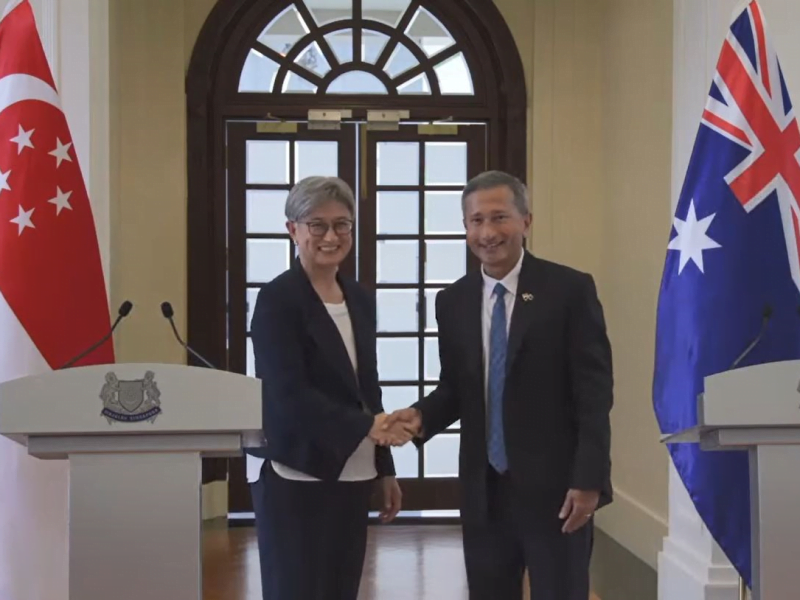Ahead of her attendance at the G20 Foreign Ministers meeting in Bali, Foreign Minister Penny Wong said on Wednesday that the Singapore-Australia Green Economy Agreement currently being negotiated would be finalised later this year.
The announcement followed a joint press conference with Singaporean Foreign Minister Vivian Balakrishnan during which the ministers also emphasised the importance of maintaining resilient supply chains. They agreed to convene an intergovernmental working group to “explore how we can construct supply chains which will withstand the test of future crises”.
There have been ten rounds of negotiations on the Green Economy Agreement so far. The agreement focuses on practical means of supporting the transition to a new energy economy and to drive trade and investments, particularly in the hydrogen sector. It aims also to remove non-tariff barriers to trade in environmental goods and services, and to decrease the regulatory burden on businesses.

During her speech at the International Institute for Strategic Studies on Wednesday, Senator Wong said the Green Economy Agreement with Singapore would be a “world-first government-to-government agreement that will drive trade, economic and environment cooperation as we decarbonise our economies”.
Senator Wong also said the federal government would deliver an ASEAN Economic Strategy “to map current and future export and investment opportunities across key ASEAN markets for Australian business and investors”. This will be accompanied by an additional $470 million for official development assistance and the establishment of an Office of South East Asia in the Department of Foreign Affairs and Trade.
Earlier in the day, Senator Wong said she preferred to set a qualitative standard for the Green Economy Agreement than to set an absolute deadline on when the agreement must be delivered.
“I would just make the point that the new Australian government has been elected with a much greater level of ambition on climate change. We are serious about it. And importantly, and this is where there is convergence with Singapore again, we see this as an enormous economic opportunity for our countries as well,” Minister Wong said.
“Part of what forward leaning and farseeing governments need to do is to identify the opportunities in that new global economy which is actually not that far away…There are great opportunities for us and I think the discussion today demonstrates there are great opportunities for both our countries to work together.”
Mr Balakrishnan said that he and Senator Wong preferred an ambitious agreement than a rushed agreement.
“This is something which obviously is of crucial importance to Singapore because we are a small tiny island state and climate change is an existential threat for us. And I suggested to Minister Wong that we can make this an ambitious, practical pathfinding agreement, one which will make a difference to our economy, one which will fulfil the climate ambition of our people, one that makes sense to the business sector as well,” Mr Balakrishnan said.
Mr Balakrishnan said that Singapore and Australia are “long-standing natural partners”. He also highlighted the opportunities in the hydrogen sector as Australia seeks to become a hydrogen hub and Singapore grows its bunkering services.
Reflecting on the difficulties of the Covid-19 pandemic, the ministers agreed that both Singapore and Australia were mutually reliable and trustworthy suppliers to each other. She also reiterated that the Australian government sees its security in the region and would bring deep engagement to its relationship.
Work on a Green Economy Agreement with Singapore began in June 2021 following an agreement between former Prime Minister Scott Morrison and Singaporean Prime Minister Lee Hsien Loong. A joint working group was formed in August 2021 before launching formal negotiations in September that year. A joint vision statement on the agreement was launched in October.
Australia and Singapore also have an existing memorandum of understanding to “advance cooperation on low-emissions technologies and solutions” which was signed in 2020. This is one of the six low emissions technology partnerships signed as a part of the Technology Investment Roadmap published by the previous federal government.
Australian energy infrastructure company Sun Cable expects to supply 15 per cent of Singapore’s power supply by 2027 through its $30 billion Australia-Asia PowerLink. Construction is expected to begin by 2024 and will extend from the Northern Territory to Indonesia and on to Singapore.
Minister Wong said that the Sun Cable project is “the kind of ambition we will need to face up to the challenge of climate change and set the region up for a more prosperous future – powered by cleaner and cheaper energy”.
Do you know more? Contact James Riley via Email.

